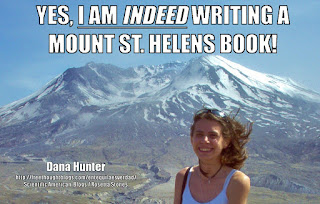Vocabulario:
- I just fetched my Mount St. Helens
- for sorting out what I'll need
- I'm working on
- flipping through the photos
- it's just overwhelming
Texto:
How I Wish I'd Known It Was Erupting At the Time...
Of course, if I'd know Mount St. Helens was actually erupting at the time, I'd probably have never gone. Volcano phobia, doncha know. I did haz one. But I thought all the eruptions were over, so I went up the mountain with my old friend Victoria, and didn't realize until long afterward that we'd been there during an eruption. Sometimes, they're that quiet!
I bring it up now because I just fetched (=busquei) my Mount St. Helens photos off the external hard drive in preparation for sorting out (=resolvi) what I'll need for the book I'm working on (note the preposition is not in). I couldn't resist flipping through (=folhear) the photos from that May 13, 2007 trip, and ran across the one Victoria took of me with my favorite volcano in the background. Alas, we only had my horrible old digital camera, so the pictures aren't spectacular, but this one turned out well enough for me to crop to a nicety.
That was such a great trip! The first time you visit Mount St. Helens, it's just overwhelming (=impressionante). You're passing through this beautiful, lush, verdant forest, and suddenly, boom - no forest. It's just gone. And there's this huge mountain with a ginormous gap in it right in your face. I don't think there's an actual way to prepare yourself to see that.
And if you were there in May of 2007, you'd have parked in the parking lot, stepped out, and seen this:
The parking lot was completely covered in burns. It was about then we began questioning the wisdom of bringing the cloth-top convertible. But hey, it was the fastest car we owned, and when you're both visiting an active volcano for the first time, even if you aren't aware that it's actually right-that-moment erupting, you bring the fast car just in case you need to flee. Well, that, and convertibles are cool.
So yes, you're looking into that serene, snow-covered crater and thinking I've lost a few of the more critical marbles. That doesn't look anything like an erupting volcano, right? But, my darlings, it was! Check it out:
In July 2007, the volume of the new dome was 93 million cubic meters (121 million cubic yards). This is slightly larger than the volume of the 1980–1986 dome. The new dome grew a small additional amount from August 2007 to January 2008, but a thick winter snowpack in the crater this winter prevents us from measuring that value accurately.
Dome growth during 2004-2008 lasted half as long (3 years) as the 1980-1986 eruption (6 years) while adding approximately the same amount of lava to the crater. The combined volume of the 1980-86 and 2004-08 lava domes is about 7 percent of the volume that was removed by the landslide on May 18, 1980, and 11 percent of the volume of the present horseshoe-shaped crater. The most obvious difference between the two periods is that dome growth during 1980–1986 was episodic, with growth spurts that lasted from a few days to nearly a year, interspersed with periods of no growth that lasted from several weeks to almost a year. In contrast, dome growth during 2004–2008 was continuous from October 2004 to January 2008. [emphasis added]
So while we were doing our glamor shots there, and having ecstatic fits over how cool everything was (and I was celebrating all the dry dirt - I mean, you have no idea how happy dry dirt makes you when you've just come from Arizona to Western Washington and thought you'd never see any actual dry dirt ever again), Mount St. Helens was quietly building her dome. Yes, snow could accumulate on parts of it. Yes, all looked serene. But Victoria and I noticed wisps of steam here and there - though, sadly, it's hard to tell what's steam and what's blowing snow with that crappy camera - and there were those scorch marks. So we knew something was up!
I don't know if it was hot enough then for infrared to show it well, but here's a spiffy image from 2004 showing you that you can have your fire and your ice, you betcha!
Totally looks like a campfire up there, doesn't it just?
Alas, the volcano is not busy dome-building today, so I have no eruption photos with my nice current camera. Perhaps soon. You see, she's definitely not done. Just resting.
Now, a lot of you lately have been not-so-subtly nudging at me to get a book out about Mount St. Helens. So I have created a not-so-subtle meme for you. You can download it, print it, and hang it up in a prominent place.
The book on the eruption will take some time to complete, but it's in progress. I'm also working on a west-side guide which I hope to have out by the end of summer. So, y'know. Be ready for that. I'm off to work on it now, actually. Bye-ee!



